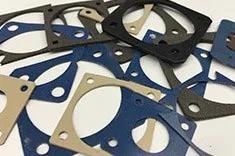EMI Shielding Products
- Custom Gasket Fabrication
- Connector Gaskets
- Bonded O Ring
- Custom Gaskets
- Conduct-O-Knit Knitted Wire Mesh
- Conduct-O-Seal Combo Gasket
- Conduct-O-Elastomer
- Conduct-O-Seal Oriented Wire in Silicone Gasket Material
- Conduct-O-Mesh Tape
- Conduct-O-Foam
- Conduct-O-Bond
- Optical Filters For Electronic Displays
- Shielded Vent Panels
- ESC Board Level Shielding
- 300 Series
Understanding the Crucial Differences: Beryllium Copper EMI Gaskets vs Copper Nickel EMI Gaskets
 The selection of EMI gaskets is a crucial step in ensuring electronic enclosures' electromagnetic shielding effectiveness (SE). Two primary types of EMI gaskets—Beryllium Copper finger-stock gaskets and Copper-Nickel foam gaskets—are often compared for their performance characteristics. By understanding these gaskets' nuances and specific applications, you can confidently navigate the decision-making process and select the most suitable gasket for your needs.
The selection of EMI gaskets is a crucial step in ensuring electronic enclosures' electromagnetic shielding effectiveness (SE). Two primary types of EMI gaskets—Beryllium Copper finger-stock gaskets and Copper-Nickel foam gaskets—are often compared for their performance characteristics. By understanding these gaskets' nuances and specific applications, you can confidently navigate the decision-making process and select the most suitable gasket for your needs.
Shielding Effectiveness Measurement
- Beryllium Copper Finger-Stock Gaskets - Beryllium Copper finger-stock gaskets are constructed from Beryllium Copper, a material renowned for its exceptional electrical conductivity and mechanical resilience. These gaskets demonstrate superior shielding effectiveness (SE) across a wide frequency range, typically from 1 to 10 GHz. The high SE performance of Beryllium Copper gaskets is attributed to the material's excellent conductivity and structural properties, which provide robust protection against electromagnetic interference (EMI). Beryllium Copper gaskets stand out with their higher SE, making them the go-to choice for applications requiring stringent EMI shielding. Their exceptional performance at higher frequencies is a crucial advantage, especially in environments with demanding performance requirements. However, Beryllium Copper gaskets are generally more expensive due to the costs associated with the material and manufacturing processes.
- Copper-Nickel Foam Gaskets - Copper-nickel foam gaskets are composed of a foam core covered with Copper-Nickel fabric, combining flexibility with conductive properties. While these gaskets offer lower SE than Beryllium Copper gaskets, they still provide adequate performance for many applications, especially at lower frequencies. Copper-nickel foam gaskets offer a cost-effective solution thanks to their ease of handling and flexibility. They are suitable for less demanding applications where moderate shielding effectiveness is sufficient. However, their lower SE limits their suitability for high-performance shielding requirements, particularly at higher frequencies.
Which EMI Gasket is Right for You?
Choosing the appropriate EMI gasket involves assessing the application's specific shielding requirements. Beryllium Copper gaskets are ideal for high-performance applications where maximum shielding effectiveness is essential. They are suitable for environments with high-frequency EMI concerns, where robust protection is critical. Conversely, Copper-Nickel foam gaskets are more appropriate for cost-sensitive applications where moderate SE is acceptable. These gaskets are well-suited for situations where flexibility and ease of installation are prioritized over maximum SE, making them a practical choice for general-purpose enclosures and consumer electronics.
Making the Right Choice for EMI Gaskets for Shielding Solutions
The decision to use Beryllium Copper or Copper-Nickel EMI gaskets should be based on the application's specific needs. With their superior shielding effectiveness, Beryllium Copper gaskets are best suited for high-frequency, high-performance environments. Despite their higher cost, they offer unmatched protection against EMI. Conversely, Copper-Nickel foam gaskets provide a cost-effective solution for applications with less demanding shielding requirements. Their flexibility and ease of installation make them a practical choice for various uses, balancing performance with affordability. One can decide on the best EMI gasket to use by considering the performance characteristics and specific application requirements.
Related Reading
- Understanding EMI Gasket CorrosionEMI gasket corrosion is a degradation process affecting metals. Metals react chemically or electrochemically with their environment, forming more stable compounds.
- RFI Shielding and RFI Attenuating
- RF Shielding and its Critical Role in Modern Electronics



